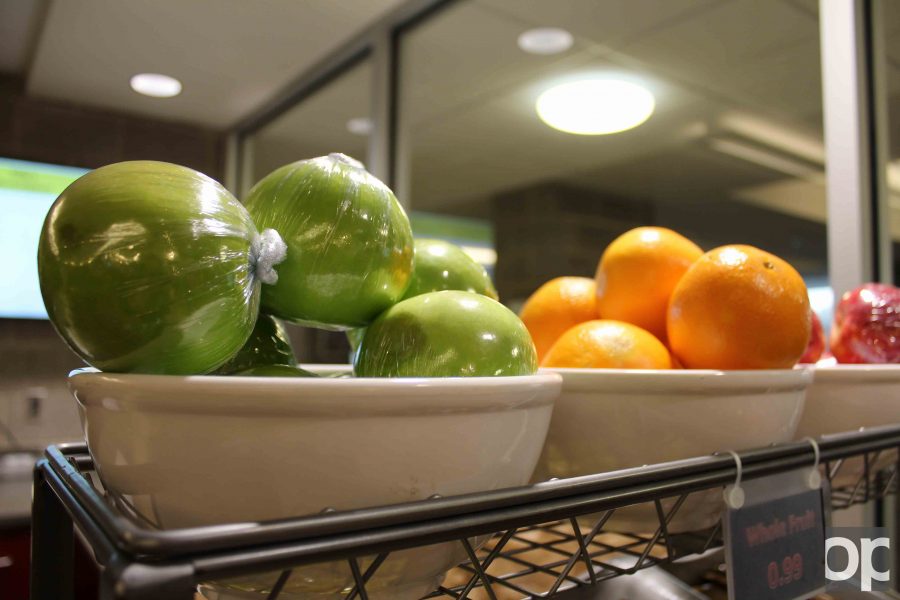How to eat healthy in college
Students can get fresh fruits on campus to maintain their healthy diets.
Whether it’s grabbing something quick between classes or snacking while staying up late to study, making smart eating choices while on campus isn’t always easy.
However, Student Health and Wellness Coordinator Erica Wallace has created many programs focusing on how to do so at Oakland University.
Before beginning, she made a clarification.
“As an aside, I have ethical concerns with calling food ‘bad’ or ‘good’ and ‘healthy’ or ‘unhealthy,’” she said. “There are foods like avocados, which are calorie-dense but contain many beneficial nutrients, or something like a cookie or doughnut, that while not ideal to eat every day, is still fine as a treat in moderation.”
There are many reasons why students make poor eating choices.
Based on the health-coaching clients and other students she has worked with, poor time management is often a factor. Students may skip breakfast, rush through meals or resort to fast food.
Wallace also cited students’ lack of knowledge, as they don’t know correct portion sizes or the nutritional value of certain foods.
What to keep in mind
“You should generally aim for a balance of carbohydrates, protein and a little fat in every meal while trying to limit sodium and added sugar,” Wallace said.
A meal for the average person should contain 500-600 calories, which is based on a low activity level and three meals a day.
People should shoot for three meals, which fuel the brain and prevent people from getting too hungry and overindulging once it’s time to eat, according to MoneyCrashers.com.
Having snacks like fruits and veggies, granola bars and whole-grain crackers on hand can help tide appetites. There are also high-protein options like hummus or hard-boiled eggs, as suggested by LiveStrong.org.
Wallace gave a few ideas of balanced meals around OU’s campus.
At Panda Express, one healthy choice is a bowl filled with half veggies, half brown rice and meat that hasn’t been fried.
There is also a grilled chicken sandwich at Chick-fil-A, accompanied by a side salad or fruit cup.
When at Moe’s Southwest Grill, go for a bowl with rice, beans, steak or chicken, heaps of vegetables, and minimal dairy toppings and guacamole. Or get the burrito, but skip the rice.
At Subway, a healthy choice is whole grain bread with a lean meat like chicken or turkey, lots of vegetables, and a small amount of dressing or condiments, paired with some fruit.
And while salads are the obvious choice, students should try to include protein like lean meats, nuts or legumes, and load up on fruits and veggies. As for the dressing, limit the amount and go for more oil- and vinegar-based options, as suggested by MoneyCrashers.com.
As for staying up late to crank out that paper, it may be tempting to reach for a soda or energy drink. However, water may do the job without the extra sugar. To stay active, the body and its organs need many glasses of water to function correctly. Becoming dehydrated can make people feel tired and moody, according to NewHealthAdvisor.com.
What to limit
Wallace recommends trying to consume less fried foods and meats that are higher in fat, like beef, bacon, ham, pepperoni and sausage.
She also made it clear that an individual doesn’t have to cut out these foods completely.
“If you’re really craving a food, my suggestion is to get and enjoy a small portion of it, and make sure the rest of your meals that day are balanced,” she said. “For example, if you really want waffle fries, get a small fry and take time to enjoy every bite while pairing it with a grilled chicken sandwich at Chick-fil-A.”
This goes for other items, like a little ice cream or the smallest size of an indulgent blended coffee.
“Many people want to feel like they are getting the best value for their money, but most of us will inhale a large size without paying attention, so you get a lot of calories without even enjoying what you’re eating.”
Wallace thinks that now is the time to start making smart choices.
“Statistically, whatever habits and behaviors you develop or practice now (at college age) will stick with you,” she said via email. “Getting into good habits now means you’ll likely continue those habits and have better long-term health outcomes.”









Sandra Stjohn • Jan 21, 2017 at 2:11 AM
Thanks for sharing this healthy tips.Glad to read this post. This is a great information shared. People must know the actual meaning of healthy diet for maintaining good health and healthy heart. I always eat nutritive and healthy food, leafy vegetables, fruits and nuts to keep myself healthy. And I would like to suggest that people may also take candle nuts (http://www.nuez-dela-india.com/) which helps in weight loss and boost metabolism, helps in smooth blood circulation, reduce cellulite and keep ourself healthy fit. Instead than ordering pizza and burger students may oder a veg sandwich, or they must carry dry fruits or homemade tiffins. which will not spoil their health.
biplob • Nov 16, 2016 at 11:09 AM
To more learn about muscle building supplements to visit This link…….
http://nutrition-4-health.com/